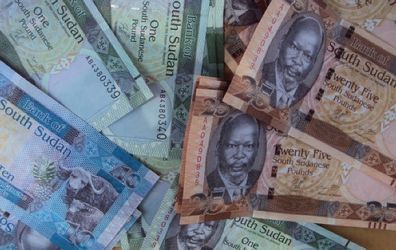Only 16% of South Sudan’s budget reaches state governments – report
May 24, 2012 (JUBA) – South Sudan provides its ten states with only 16% of the national budget, with 84% being spent by the federal government in Juba, a report by the newly-established Sudd Research Institute revealed on Thursday.

Government coffers were, until January, when South Sudan stopped exporting oil through Sudan as part of a transit fee dispute, almost completely dependent on oil revenues.
Having lost 98% of its income, South Sudan is undergoing an intense austerity programme, with leaked documents from the World Bank, published by Sudan Tribune warning that South Sudan faces a severe economic crises.
Juba is currently looking for finance guaranteed against future oil revenues, either, when exportation resumes through Sudan, or if a new pipeline is built to the East African coast.
Hard currency is in short supply in South Sudan with undercover security agents deployed across Juba to try and prevent black market trade in dollars. Currently a dollar buys 4.5 South Sudanese Pounds (SSP) in the black market and 3.7 SSP in the forex bureau and 3.1 SSP at South Sudan’s Central Bank
The report authored by Augustino Ting Mayai, the institute’s director of research, found that: “State budgets are distributed equally without regard to differential population needs, only 16 percent of the total national budget goes to the 10 states; the rest is spent by the central government.”
On average South Sudan’s states spend SSP 97mn per year.
“The Ministry of Finance and Economic Planning spends 348 million South Sudan Pound annually. The Office of the President spends 159 million South Sudan Pounds, while the Ministry of Health which is a service institution, spends only 68 million South Sudan Pounds,” the report says.
Although the study did not assume that South Sudan does not engage in rigorous policy analyses to inform its tasks, Mayai said that the institute “believe that a much more engaging, pragmatic approach is absent.”
Government spending was “missing” an “analytic component”, he said, adding that a more empirical approach was fundamentally needed, giving the example of the fact that despite the high-level of need at a state level they only received a small fraction of available funds.
The central government has been spending more than state governments since 2006, Mayai said. South Sudan gained self-rule in 2005 as part of peace deal that resulted in separation from Sudan in July last year.
The world’s youngest nation is facing many development challenges including, southern returnees from Sudan, as well as refugees from conflicts in Sudan’s southern border areas.
Overcrowding in urban areas and competition over limited resources are problems that need to be addressed, the report found.
Mayai recommended that international migration could be a source of income for the government but recognised that the presence of so many foreign workers was also a source of tension with South Sudanese citizens.
South Sudanese workers at the United Nations and other employers are often paid far less than their East African and international colleagues. Many East African immigrants have complained of the regular visa fees imposed by Juba, with some deciding not to pay recent increases, making their stay illegal.
The number of foreign immigrants into South Sudan has doubled over the last three years, according to the report, which found that high numbers of South Sudanese returning to the country has accounted for 2.2 percent of the South Sudan’s population total growth rate of 3 percent. However, poor pension schemes mean that people tend not retire, resulting in a very old work force.
The research director recommended that monitoring international migration was an important tool to inform public policy development.
“There is a need to promote research because all of all of these have policy implications,” he said.
He further suggested that the promotion of education and employment opportunities for women as a way to improve their economic opportunities, emphasising that differentials in pay affect women’s pension benefits.
Sudd Research Institute
The Sudd Research Institute was established on 12 May, with Jok Madut Jok as it’s executive director and Augustino Ting Mayai as director of the research department.
Francis Piol Bol Buk is in charge of media and public relation affairs, with Abraham Awolic, Zachariah Diing and Abraham Makoi taking up administrative assignments, leaving additional positions to be created and filled.
Speaking at the institute’s launch event, Jok, who is also the a undersecretary in South Sudan’s Ministry of Culture and Heritage, explained that the new think tank will in the interim do research in three main areas; governance; peace and security; and development and service delivery.
Other subjects that his team would research would include; social research and analysis; population dynamics and statistics; public forums; publications and specific recommendations tailored to specific government institutions; non-governmental organisations; donor agencies; and civil society.
(ST)
